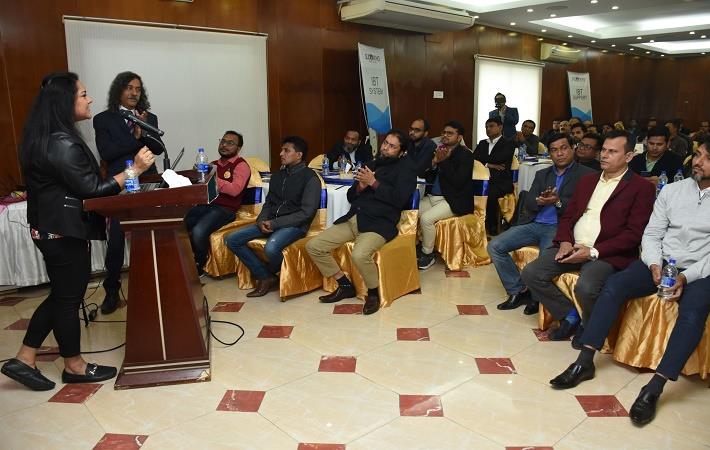
S M Rashed Mahmud, social compliance manager, M&S started the workshop with a welcome address. Sanjida Khan Majles, business and training market development coordinator, Sudokkho, said that the objective of the Sudokkho project is to reduce poverty through better training and creating job opportunities for the poor. For this, Sudokkho contributes to a stronger and more inclusive private sector training market creating better job opportunities for the poor.
Khan explained that till now Sudokkho’s IBT system has been implemented in 124 factories in Bangladesh. These include suppliers of brands like Debenhams, Primark, New Look, Tesco, Mothercare, M&S factories of leading groups like Urmi, Standard, Masco and Renaissance. She explained that with Sudokkho IBT training system, the factories can train unskilled trainees to become operators within 2 weeks, start earning a livelihood and support their family.
“Marks and Spencer is very proud of you, our supply partners. Without your dedicated efforts and progressive thinking of embracing change, we would not have been able to grow and achieve 40 per cent share of M&S’s global sourcing from Bangladesh. Today M&S is proud to source everything in clothing from Socks to expensive Suits from Bangladesh. Most of the items that we used to source from Turkey earlier, are now being produced in Bangladesh, said country head of M&S in Bangladesh Shwapna Bhowmick.
“Several companies in Bangladesh are implementing best practices like Green Factories, employment for differently abled people and greater participation of women in management. We have a very good cooperative government as well as very good industrial entrepreneurs and very good workers. There are also collaborative projects for skill development like Sudokkho. We must work together to improve the skills and efficiency of workers so that they can earn more and fulfil their dreams.”
Lauding the efforts of Sudokkho and RBC as ‘Change Makers’, Bhowmick urged the supply partners to fully utilise the opportunity to strengthen the human resource through wholehearted participation in the Sudokkho programme.
During his keynote address Dr. Rajesh Bheda, managing director of RBC, shared that Bangladesh garment factories have potential to improve productivity by almost 50 per cent and their profitability can be improved significantly through Right First Time quality. He also explained that most factors affecting productivity and quality are human related and within the reach of the management.
Bheda illustrated how Sudokkho’s Industry-based training system can transform the skills training capabilities of the factory teams. He shared that in the factories supported under Sudokkho IBT project by RBC, over 18000 trainees have been trained as sewing machine operators on the basis of the scientific principles of training and over 9000 existing workers have improved their production capacity by almost 30 per cent.
Several leading garment manufacturers have benefitted from the Sudokkho programme. Speaking at the occasion, Abdul Kalam, AGM, Fakruddin Textile Mills Limited shared that after implementation of the Sudokkho IBT system, their training duration went down from 3 months to about 3 weeks. He said that the ‘trainer- mentors’ trained under the programme are very effective in supporting the young trainees to reach optimal performance on production floor.
Ashraf, GM- HR from Standard Group also explained how the factories of his group have benefitted from participating in the programme. The interactive workshop provided excellent opportunity for the participants to understand the best practices in skills training and explore how they can introduce such training system in their factories with support from Sudokkho.
Rajesh Bheda Consulting is a management consultancy firm focussed on improving the competitiveness of the textile-garment industry organisations. RBC partners with garment manufacturer, brands, industry associations, development organisations and UN Agencies.
Fibre2Fashion News Desk (PC)